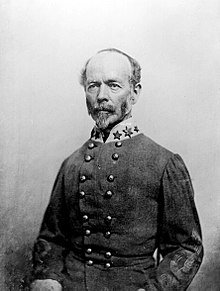 Joseph Eggleston Johnston (February 3, 1807 – March 21, 1891) was a career United States Army officer, serving with distinction in the Mexican–American War (1846–1848), and Seminole Wars. After Virginia seceded, he entered the Confederate States Army as one of its most senior general officers.
Joseph Eggleston Johnston (February 3, 1807 – March 21, 1891) was a career United States Army officer, serving with distinction in the Mexican–American War (1846–1848), and Seminole Wars. After Virginia seceded, he entered the Confederate States Army as one of its most senior general officers.
Johnston was trained as a civil engineer at the United States Military Academy at West Point, New York, graduating in the same class as Robert E. Lee. He served in Florida, Texas, and Kansas. By 1860 he achieved the rank of brigadier general as Quartermaster General of the U.S. Army.
Johnston’s effectiveness in the American Civil War was undercut by tensions with Confederate president Jefferson Davis. Victory eluded him in most campaigns he personally commanded. He was the senior Confederate commander at the First Battle of Bull Run in July 1861, but the victory is usually credited to his subordinate, P.G.T. Beauregard. Johnston defended the Confederate capital of Richmond, Virginia, during the 1862 Peninsula Campaign, withdrawing under the pressure of Union Maj. Gen. George B. McClellan’s superior force. He suffered a severe wound at the Battle of Seven Pines, and was replaced by Robert E. Lee.
In 1863, in command of the Department of the West, Johnston was criticized for his inaction and failure[1] in the Vicksburg Campaign. In 1864, he fought against Union Maj. Gen. William Tecumseh Sherman in the Atlanta Campaign. Facing an enemy with a massive numerical advantage, Johnston maneuvered to avoid having his forces surrounded or cut off from Atlanta, while looking for a chance to make a decisive stand that would turn back the tide. Although he successfully repulsed Sherman’s attempt to defeat him through direct assault at the Battle of Kennesaw Mountain, he was ultimately outflanked again forced to withdraw from northwest Georgia to the outskirts of Atlanta. Fed up with Johnston’s constant withdrawal from Confederate territory, Davis relieved him of command and replaced him with John Bell Hood. In the final days of the war, Johnston was returned to command of the few remaining forces in the Carolinas Campaign. He surrendered his armies to Sherman at Bennett Place near Durham Station, North Carolina on April 26, 1865. Union generals Ulysses S. Grant and Sherman both praised his actions in the war, and became friends with Johnston afterward.
After the war, Johnston served as an executive in the railroad and insurance businesses. He was elected as a Democrat in the United States House of Representatives, serving a single term. He was appointed as commissioner of railroads under Grover Cleveland. He died of pneumonia 10 days after attending Sherman’s funeral in the pouring rain.
Content retrieved from: https://en.wikipedia.org/wiki/Joseph_E._Johnston.
Images
[URIS id=1331]